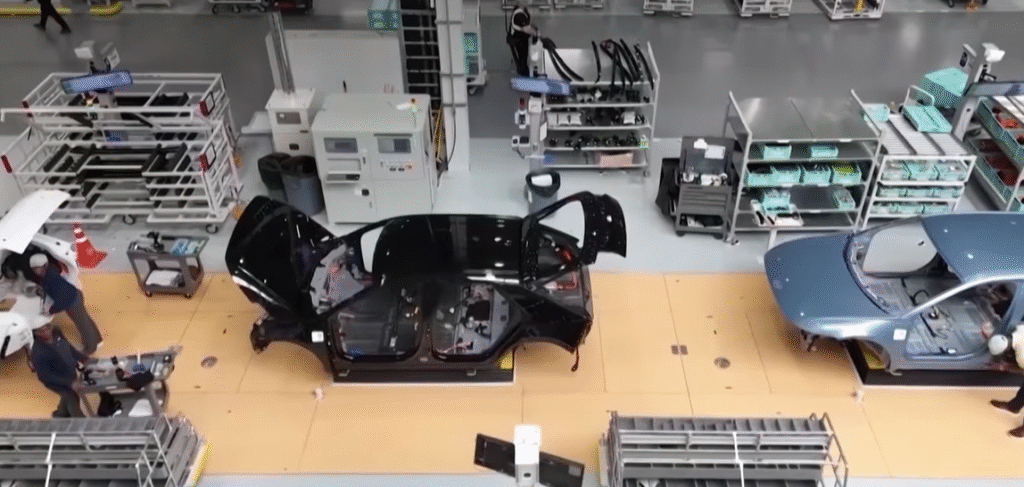Due to emotional commentary and dramatic headlines, the story that Hyundai might be closing its Georgia plant quickly gained traction. But the company has been very clear: the biggest immigration raid in American history is causing a delay, not a closure, at the plant. The construction pace has been considerably slowed by this disruption, which resulted in the detention of almost 500 highly qualified specialists, but the multibillion-dollar commitment has not been canceled.
Despite the chaos, Hyundai’s leadership has stressed continuity in recent days, with CEO José Muñoz stating that the project will proceed. His response was remarkably successful in reducing investor anxiety, much like Tim Cook’s previous assurances to Apple shareholders during supply chain disruptions that delayed the release of the iPhone. Hyundai showed an incredibly resilient confidence that is uncommon during corporate setbacks by choosing to show resilience rather than retreat.
The plant had represented an industrial revival for Georgia, with billions of dollars in supporting investment and 8,500 jobs promised. Small businesses had grown, families had moved, and local officials were proud to call it the biggest economic development project in the history of the state. When the raid swept through Ellabell, it was abrupt, startling, and extremely frustrating, like a thunderstorm cutting off electricity during a long-awaited concert. Nevertheless, there is still hope because the project is still in place and the jobs, despite their delay, are still in the future.
Hyundai Georgia Plant – Key Facts
| Category | Information |
|---|---|
| Plant Name | Hyundai Motor–LG Energy Solution Battery Plant |
| Location | Ellabell, Georgia (part of Hyundai Metaplant complex) |
| Investment Value | $7.6 billion (part of $26 billion U.S. pledge by Hyundai) |
| Purpose | Electric vehicle battery production |
| Planned Jobs | 8,500 direct jobs, thousands more indirectly |
| Current Status | Opening delayed at least 2–3 months after ICE immigration raid |
| Workers Detained | About 475 workers, mainly South Korean nationals |
| Controversy | Largest single-site U.S. immigration raid in history |
| Strategic Partners | LG Energy Solution, SK On (battery co-production) |
| Reference Link | BBC – Hyundai says opening of raided plant to be delayed: https://www.bbc.com/news/articles |

Particularly noteworthy have been the diplomatic repercussions. The president of South Korea raised concerns that these raids would deter future investment, highlighting a larger tension between the United States’ immigration enforcement and industrial missions. The situation, where national regulation and industrial necessity clash, is remarkably similar to disagreements over semiconductor policies with Taiwan and Japan. In addition to affecting a single plant, the raid strained a carefully cultivated alliance that has significantly improved in recent years due to trade agreements and shared commitments to clean energy by detaining hundreds of Korean nationals.
When international projects fail, Hyundai’s decision to temporarily source batteries from its partnership with SK On demonstrates how incredibly adaptable corporations must be. It is reminiscent of Tesla’s shift to alternate suppliers during lithium shortages or Apple’s capacity to diversify its chip supply. In every instance, being flexible has been shown to be a very effective way to get through difficult times without sacrificing long-term goals.
The raid also brought back immigration policy discussions, emphasizing that labor mobility and tax incentives are not the only factors that make America a desirable destination for foreign investment. Advanced manufacturing plants require highly specialized technicians during the construction phase, and these skills are not always able to be replicated domestically. Ironically, the United States runs the risk of slowing its own green aspirations by limiting these roles. In order to prevent administrative bottlenecks from undermining ambitious goals like widespread EV adoption, industry groups have argued that visa reforms specifically suited to industrial projects would be especially advantageous.
The story has been culturally assimilated into a broader discourse about perseverance, disappointment, and delay. Communities in Georgia are now dealing with delayed prosperity, much like music fans feel let down when a major tour is postponed. The comparison is significant because it shows how emotionally people invest in promises of future happiness, whether they come from a well-known pop star or a multinational automaker. The dream is still alive despite the painful setback.
With hashtags likening the incident to Amazon’s cancellation of its New York headquarters, social media heightened the drama. Hyundai, in contrast to Amazon’s withdrawal, has reiterated its commitment, stating that the project is only postponed and not dead. This distinction serves as a crucial reminder to communities that failure is not the same as setback. Indeed, once it is up and running, experts predict that the plant will be exceptionally successful in speeding up the EV transition, supporting Georgia’s economy and America’s climate goals.
Adoption of renewable energy has exploded in the last ten years, and the Hyundai plant is a vital component of that trend. Although the long-term trajectory is still encouraging, the transition to cleaner transportation is slowed down with each month of delay. Georgia could become a focal point of America’s electric vehicle future through the integration of local labor and global expertise. More important than the project’s timeline disruption in the context of climate urgency is its resilience.
Progress seldom comes without turbulence, and the wider lesson is very evident. In addition to steel and concrete, industrial projects of this size also require human ambition, diplomacy, and the rule of law. Despite rumors to the contrary, Hyundai is not closing its Georgia plant. Rather, it serves as an example of how international commitments can be curtailed momentarily but eventually persist. Politicians may argue over accountability, communities may sigh impatiently, and executives may rush to find other options, but the story remains one of perseverance.

